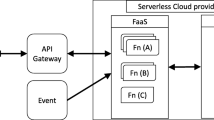Abstract
Uncontrolled overload is one of the major causes of the system’s decline in reliability and performance for web applications. It also harms the construction of trustworthy software. This paper presents a degradation-based mechanism to adaptively control overload in complex, dynamic web applications. In our mechanism, the bottlenecks in the application’s performance are determined by internally monitoring the performance and resource utilization state of the application, which is decomposed into a set of services. After locating the bottlenecks, two decision algorithms are proposed to dynamically and adaptively generate proper degradation plans without delay. By degrading the service which consumes critical resources and has a low priority from the perspective of business logic, the application can keep providing key services even when overload occurs. We implement a prototype and conduct a case study on a wiki application. We also evaluate our approach and demonstrate its effectiveness in simulated overload cases. Through handling overload, we make a breakthrough in building trustworthy software in an open, dynamic and rapidly changing environment.
Similar content being viewed by others
References
Liu K, Shan Z G, Wang J, et al. Overview on major research plan of trustworthy software (in Chinese). Bull Natl Nat Sci Found China, 2008, 3: 145–151
Wang H M, Tang Y B, Yin G, et al. The trustworthiness of the Internet software (in Chinese). Sci China Ser E-Tech Sci, 2006, 36: 1156–1169
Schroeder B, Harchol-Balter M. Web servers under overload: How scheduling can help. ACM Trans Internet Technol, 2006, 6: 20–52
Guitart J, Torres J, Ayguad E. A survey on performance management for Internet applications. Concurr Comput Pract Exp, 2010, 22: 68–106
Elnikety S, Nahum E, Tracey J, et al. Method for transparent admission control and request scheduling in e-commerce web sites. In: 13th International Conference on World Wide Web (www’04), New York, 2004. 276–286
Iyer R, Tewari V, Kant K. Overload control mechanisms for web servers. In: Workshop on Performance and QoS of Next Generation Networks, Nagoya, 2000. 225–244
Chen X, Chen H, Mohapatra P. An admission control scheme for predictable server response time for web accesses. In: Proceedings of the 10th World Wide Web Conference (www’01), Hong Kong, 2001. 545–554
Chen H, Mohapatra P. Session-based overload control in QoS-aware web servers. In: Proceedings of IEEE INFOCOM 2002, New York, 2002. 516–524
Diao Y, Gandhi N, Hellerstein J, et al. Using MIMO feedback control to enforce policies for interrelated metrics with application to the Apache Web server. In: Proceedings of the Network Operations and Management Symposium 2002, Florence, 2002. 219–234
Guitart J, Carrera D, Beltran V, et al. Designing an overload control strategy for secure e-commerce applications. Comput Netw, 2007, 51: 4492–4510
Welsh M, Culler D. Adaptive overload control for busy Internet servers. In: Proceedings of the 4th Conference on USENIX Symposium on Internet Technologies and Systems-Volume 4 (USITS’03). Berkeley: USENIX Association, 2003. 43–57
Abdelzaher T, Bhatti N. Web content adaptation to improve server overload behavior. Comput Netw, 1999, 31: 1563–1577
Urgaonkar B, Shenoy P. Cataclysm: Scalable overload policing for Internet applications. J Netw Comput Appl (JNCA), 2008, 31: 891–920
LeFebvre W. CNN.com: Facing a world crisis. In: Invited Talk at USENIX LISA’ 01, 2001
Chandra S, Ellis C S, Vahdat A. Differentiated multimedia web services using quality aware transcoding. In: Proceedings of IEEE INFOCOM, 2000. 961–969
Fox A, Gribble S D, Chawathe Y, et al. Cluster-based scalable network services. In: Proceedings of the 16th ACM Symposium on Operating Systems Principles, St.-Malo, 1997. 78–91
Fox A, Brewer E A. Harvest, yield and scalable tolerant systems. In: Proceedings of the 1999 Workshop on Hot Topics in Operating Systems, Rio Rico, 1999. 174–178
Abdelzaher T, Shin K, Bhatti N. Performance guarantees for web server end-systems: A control-theoretical approach. IEEE Trans Parallel Distrib Syst, 2002, 13: 80–96
Welsh M, Culler D. Adaptive overload control for busy internet servers. In: 4th Symposium on Internet Technologies and Systems (USITS’03), Seattle, 2003. 43–57
Author information
Authors and Affiliations
Corresponding author
Rights and permissions
About this article
Cite this article
Wang, Z., Zhou, M. & Mei, H. Towards a degradation-based mechanism for adaptive overload control. Sci. China Inf. Sci. 55, 2708–2722 (2012). https://doi.org/10.1007/s11432-012-4738-9
Received:
Accepted:
Published:
Issue Date:
DOI: https://doi.org/10.1007/s11432-012-4738-9




